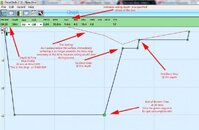A few weeks ago I took my 15 yr old on a dive with a 135 ft max depth. He stayed up around 120 or so I think. We were using computers (and nitrox) and we went a little into deco. We each had a pony bottle. We had not really planned to put him into deco and for some reason his computer showed more deco than me... maybe 6 minutes. He had an aluminum 80 tank.
It was no big deal really, but it did show me a problem with my somewhat causal attitude about teaching him this stuff (he was issued a PADI Jr. Diver card several years ago). Normally, I am pretty casual about safety stops and I generally lead and he follows and he often will stay 5-8 feet below me on ascent and on the hang. He can control his level easily (if he cares), but I've been pretty casual about it, I guess.
So we get up to the stop at 20 ft (a slow ascent has not reduced our deco time)and I have a reel and a float, so I have it easy, I just dump air from the BC, get heavy and hang down from the float with no need to pay attention to depth, since I am effectively tethered at the desired depth. Well the kid keeps sinking down and hanging like 5 ft below me. I signal to ascend a little and he does, but then 30 seconds later he is 5 ft below me. I quickly loose patience with him on this and my signals get more frantic and intense, and he still doesn't seem to "get it" that I want him hanging RIGHT with me at the desired depth. In retrospect, I should have handed him the float and that would have fixed his deco stop depth.
He now understands that when we do a "real deco" dive, he needs to be a little more precise in his drift diving deco stop depth precision. On the boat, I explained that the scubaboard Nazi's worry about holding stop depths to less than a foot and they seem to make it into some sort of competition.
So the precision of the stop depth is something that may be a little different for a recreational versus technical diver.




